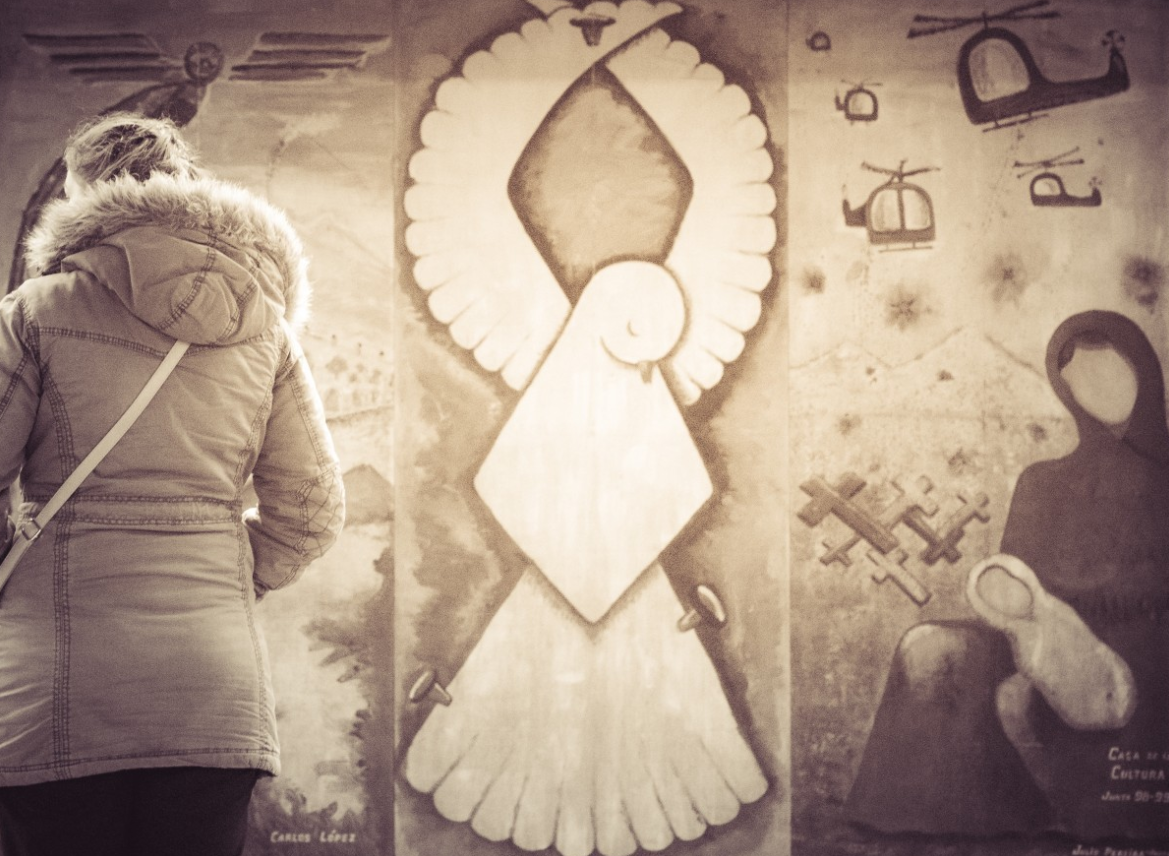Configuring Spirituality and Justice
Thomas Merton, Seeking Peace, and Nuclear Realities
by Michael Ramos
Thomas Merton – Photo: Sojourners
The Trappist monk, Thomas Merton, who passed away fifty years ago last year, is remembered largely for his prolific spiritual writing from the cloistered monastery. Yet his writing on nuclear weapons and peace still speaks to us today. His words carried weight because they were grounded in his immensely compassionate and rich spirituality, centered on discovering our True Selves in the larger Divine Self, and in so doing generating the capacity and bearing the audacity to embrace the world.
His work for peace, to end war, to promote nonviolence and to place our trust in God first were altogether an act of love for humankind that he could see, hear, touch, feel, and smell from his inner core. No surprise, a treasure trove of books on Merton’s life and writings exist.
Just now, though, let me briefly share ten things I’ve learned from Thomas Merton’s about peace.
The nuclear arms buildup is a form of idolatry. In “Original Child Bomb,” Merton’s prose-poem about the development and launch of the atomic bombs on Hiroshima and Nagasaki, he critiques the religious-like devotion and “worship” of the bomb and the failure to see, feel, and understand the significance of – and responsibility for – the obliteration of vast numbers of human beings by a creation of human hands. Daniel Ellsberg has noted how close we have come to executed plans for nuclear usage. The peril for all human life continues today: Do we place our faith in nuclear weapons or in the restoration of human relationships in concert with Spirit?
“The root of war is fear.” In Merton’s article by that title, he suggests, “At the root of all war is fear, not so much the fear people have of one another, as the fear they have of everything. It is not merely that they do not trust one another: they do not even trust themselves.” (New Seeds of Contemplation) Being attuned to Spirit leads one to the logic of love in practice – the way to peace.
Nonviolence is a way of life, at the core of spiritual practice in many traditions. Far from being passive, nonviolence in the way of Gandhi and Martin Luther King Jr. is active, “lifting up the boil” in order to make for equitable relationships and dismantling of unjust systems. It is a practice at the personal, local, communal, and societal levels that leads to mutual liberation.
A Christian – and a religious – ethic worth its salt leads to peacemaking. Merton, like King, saw nonviolence as the alternative to nonexistence. And like Gandhi, satyagraha or soul force had for him the power to move mountains. Or, as Merton’s friend Thich Nhat Hanh has put it, the way to peace is to “be peace.”
Nuclear proliferation is countered by faithfulness to our deepest teachings, for example the Sermon on the Mount for Christians. Compassion is a universal spiritual value that can undergird all our efforts. At the same time, as Karen Armstrong has said, “Compassionate cities are uncomfortable cities,” meaning that the status quo is altered because equitable and inclusive tables shake up the dominant power and use-of-force dynamic that is so common in our culture.
Resistance is a restorer of sanity and wholeness. Nonviolence fosters movement in light of the basic unity of humankind, “for the healing and reconciliation” of the human being with oneself, fellow creatures, and the human family. (Blessed Are the Meek)
Religious wisdom from all the great (and smaller) traditions have much to teach us all. Faithfulness and nonviolence are eminently practical; they are about seeing reality in order to transform reality, rooted in the sacredness of the Earth and all life. Religious wisdom is spiritual food for this world. Cooperation with Spirit in its many forms is the antidote to cooptation and complicity, which we are charged to confront with sober honesty and humility.
“Church” as sometimes conceived is more of an obstacle than vehicle for transformation. The person of faith can take risks for justice as a matter of testifying to truth, not just as an ideal, “but to the truth that is incarnate in a concrete human situation, involving living persons whose rights are denied or whose lives are threatened.” (Blessed Are the Meek) Church bodies sometimes are sometimes more concerned with self-preservation than social change, and even at times are aligned with forces that trumpet military solutions against real or perceived enemies.
Efforts to stop a “first-strike” nuclear policy will lead to persecution. The concept of “first-strike,” suggesting the concept of a “winnable” nuclear war, is part of the “madness of the warmakers,” an illusion. (The Root of War is Fear) Challenging such concepts threatens structures that stand to benefit and profit from the permanent war economy and will lead to persecution of witnesses promoting peace with justice.
Seeking inner and outer congruity in faith and practice can change the world. In the wonderful dialogue between Thich Nhat Hanh and Daniel Berrigan, The Raft is Not the Shore, Nhat Hanh affirms Berrigan’s insight that community is not only people working for peace, but also people of peace: “Communities of resistance can be places where people can be restored to wholeness more easily.” In affirming the dignity of all people, life, and the planet, the integrity with which we live can touch the lifestream in others and build spaces of communion and transformation.
Thomas Merton’s writing attracted me for connecting the dots between spirituality and justice-seeking in an integral way. He highlighted the nonviolent alternative to our society’s predominant war-making and preparations for war. His inspiration has led many to various forms of spiritually-grounded community-building and prophetic witness. Today, as much as ever, his passion for peace can help shape our response-ability to confront and dismantle the idols of war, for our sake and that of the planet.
Header Photo: Pxhere



